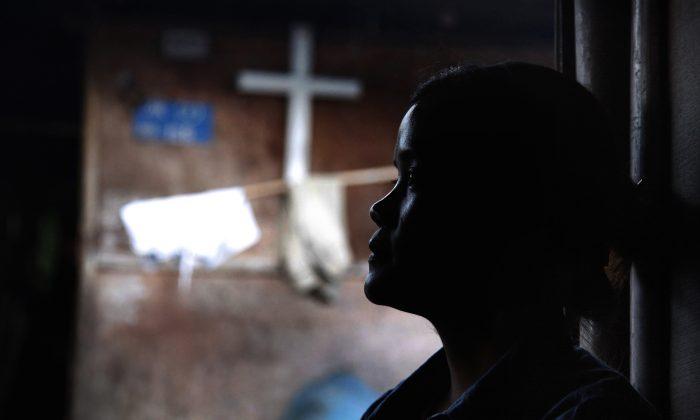China’s real estate market is akin to a Ponzi scheme with the government acting as the dealer, referee, and big player. The market is entirely propped up by loans.
From a market point of view, Chinese real estate has no investment value. To consider it an investment product, one needs to first examine the existence of a bubble based on three indicators: the ratio between real estate investment and GDP, the price to income ratio, and the rental ratio.
The real estate investment to GDP ratio is mainly used to evaluate the anticipated future price and whether real estate investment is overheating. China’s real estate investment and GDP ratio has been high: 14.8 percent in 2013 and 14.18 percent in 2015.
Since 1960, real estate bubbles have all burst in countries where real estate investment and GDP ratios were higher than 6 percent . When the Japanese real estate market collapsed, real estate investment accounted for only 9 percent of GDP. At the start of the U.S. subprime mortgage crisis, the ratio reached a local peak of 6.2 percent.
Other data, for instance the affordability of housing, as well as rental income from housing, shows that real estate holds hardly any interest as an asset class in China, and is little better than a gamble.
Then why does the Chinese government allow the use of large amounts of loans to support real estate?
Real Estate Dependence Sickness
China’s economy is suffering from real estate dependence sickness, primarily because local governments are financially dependent on land.
China’s local governments all make money on land sales as all land in China is state-owned. Between 2003 and 2015, their land dependence ratio (the ratio of land transfer fees to general budgeted revenues) averaged nearly 50 percent .
For example, Suzhou city, a second-tier city, had an average land dependence ratio of 82.6 percent during the first eight months of 2016, up from 40.58 percent in 2015. In Hangzhou, Hefei, Nanjing and other cities, land dependence ratios were also above 50 percent. Therefore, local governments must act as big players in the housing market and keep supplying land to the market.
In addition, the real estate industry has an important position in China’s economy. As early as 2009, Yu Bin, the Macroeconomic Research Department Chair at China’s State Council, publicly stated that the real estate industry accounted for 6.6 percent of GDP and one quarter of investment, with up to 60 directly related industries, and had become the direct lifeline of China’s economy. Once there are huge real estate market fluctuations, dozens of industries relying on real estate will suffer incalculable losses and may even cause the collapse of China’s real economy.
Now, with the depressed real economy, what would the Chinese regime do if real estate collapsed? Therefore, the central bank must be the dealer and keep issuing money and distribute dice to the local governments, real estate developers, and buyers, for them to gamble.
Political Survival
From a market economy point of view, China’s real estate boom will die. In fact, the world has experienced real estate bubbles about a hundred times. In the last 20 years, we watched the collapse in Japan, the world’s second largest GDP, and the United States, the world’s largest GDP. While the bubble in Japan slowly deflated, the United States suffered an instant collapse.
Past experience tells us that China’s real estate bubble will burst sooner or later. The only question is how it will collapse.
For the Chinese government the consequences of a real estate collapse are very serious. The first domino to fall will be a local debt crisis, followed by a financial crisis. So, in the government’s view, real estate is the industry that must be saved by all means. In 2015, the majority of the 11 trillion yuan new loans issued went to the real estate market. This trend continues in 2016 and might surpass 2015. Therefore, it can be expected that as long as the central bank continues to issue loans, home prices will keep rising.
In the United States, the Ponzi scheme went bankrupt because players, banks, and the government (the referee) are all parties with different interests. In China the government is the referee, the central bank the dealer, and local governments the players.
Real estate in China has become the central bank’s currency pool. Supplying the real estate market with credit has become the Chinese government’s way of maintaining economic stability. The worst consequence of this approach is inflation. However, inflation only diminishes social wealth. It does not create external military threats or internal conflicts that are difficult to suppress, and it will not directly lead to the collapse of the regime. Zimbabwe’s hyperinflation was many times worse than China’s but did not lead to the downfall of the regime.
In addition, the Chinese government has long ago put in place a set of market controls, such as purchase limits, sales limits, and price limits. It uses them in whichever way it wants to. Since the government is the referee, dealer, and big player, the bubble can become much bigger than the ones in Japan and the United States. And the government has a lot more room to maneuver.
He Qinglian is a prominent Chinese author and economist. Currently based in the United States, she authored “China’s Pitfalls,” which concerns corruption in China’s economic reform of the 1990s, and “The Fog of Censorship: Media Control in China,” which addresses the manipulation and restriction of the press. She regularly writes on contemporary Chinese social and economic issues.





